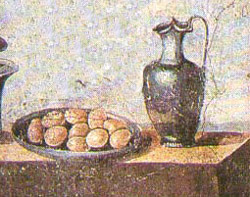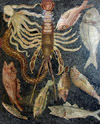
You are in: Home Page » Recipes of the ancient Pompeii » OVA SFONGIA EX LACTE (Pancakes with Milk)
OVA SFONGIA EX LACTE (Pancakes with Milk)

(Apic. 7, 13, 8) Ingredients:
- 4 eggs
- 271 ml milk
- 1 ounce oil
- a little bit ground pepper
Instructions:
-------------
Mix eggs, milk and oil until you have a pancake dough. Fry in a pan and serve topped with a little bit of pepper.





